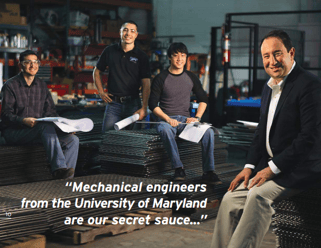 Since moving to the Baltimore area, Marlin Steel has undergone some dramatic changes as a company. Where once the company focused on providing commodity bagel baskets, it now focuses on creating custom-engineered baskets for high-stress applications.
Since moving to the Baltimore area, Marlin Steel has undergone some dramatic changes as a company. Where once the company focused on providing commodity bagel baskets, it now focuses on creating custom-engineered baskets for high-stress applications.
This change in focus required many other changes within Marlin Steel, from the methods of assembly used by front-line workers, to the employees themselves. The addition of factory automation helped to make results more consistent and reliable, the focus on adding trained personnel with degrees in mechanical engineering transformed what Marlin was capable of.
In their spring 2015 publication, the University of Maryland took note of Marlin Steel’s focus on hiring talented people with mechanical engineering degrees right out of college. Specifically, they took note of how Marlin Steel was leveraging talent from the University of Maryland’s Clark School of Engineering. Read the entire article here.
Why Marlin Sought out Mechanical Engineers
When Marlin Steel made the switch to using factory automation to create precision-engineered baskets, it soon became apparent that just having precise equipment alone would not be enough.
At the time, Marlin Steel was new to selling baskets that had to meet exacting tolerances. The clients that Marlin was interacting with weren’t restaurant and bakery owners, they were mechanical engineers with specific needs. Without mechanical engineers on the Marlin team, it was effectively impossible to have the kind of high-level discussions needed to make sure the baskets could fulfill all of the client’s needs.
It was then that Marlin’s owner realized he needed employees who could speak “mechanical engineer.”
To get the right people for the job, Marlin Steel started tapping into the talent pool at the University of Maryland’s Clark School of Engineering. Here was a group of dedicated individuals from the state of Maryland who had the training and know-how to help Marlin improve its manufacturing, but to speak comfortably with clients so that their needs would be addressed in an effective, efficient manner.
Now, mechanical engineers make up 20% of Marlin Steel’s workforce.
How Mechanical Engineers Make Marlin Better
 The presence of mechanical engineers in the Marlin workforce has helped to transform the company into a superior provider of custom-engineered baskets to solve manufacturing challenges.
The presence of mechanical engineers in the Marlin workforce has helped to transform the company into a superior provider of custom-engineered baskets to solve manufacturing challenges.
With their training in mechanical engineering, the graduates of the Clark School of Engineering can quickly grasp the nature of a client’s production process and come up with solutions to meet the client’s needs.
An engineer’s knowledge of the mechanical properties of different materials and how they react to the stresses of a given client’s manufacturing process allows them to optimize basket designs for the best possible performance.
Every day, Marlin’s mechanical engineers are coming up with creative solutions to the unique challenges posed by individual clients. These solutions allow Marlin to bring clients top-quality solutions to their needs on short notice.
Even better than their ability to crunch numbers is the ability of these mechanical engineers to speak with clients. These mechanical engineers can explain their design decisions to customers in a clear and effective manner that demonstrates how the customer benefits from the design.
This helps Marlin’s customers see the value in using specific materials or in tweaking an existing design. The end result is a better custom basket that helps to speed up production while prolonging the useful life of the customer’s basket.
The University of Maryland Difference
 What makes the Clark School of Engineering at the University of Maryland desirable as a source of talent for Marlin is that they do more than just teach to tests. As Marlin Steel Lead Engineer Tony Witt stated in the UMD article, “each of my courses went above and beyond the typical textbook exercises to focus on practical applications for the fundamentals we were learning.”
What makes the Clark School of Engineering at the University of Maryland desirable as a source of talent for Marlin is that they do more than just teach to tests. As Marlin Steel Lead Engineer Tony Witt stated in the UMD article, “each of my courses went above and beyond the typical textbook exercises to focus on practical applications for the fundamentals we were learning.”
By bringing the lessons beyond the textbook, the Clark School of Engineering helped to prepare its students for much more than just crunching numbers, it helped prepare students to actually work in their field.
Each of the team members Marlin has recruited from the University of Maryland is in there for the long haul, as the engineering team at Marlin enjoys a very low rate of turnover.
The combination of text learning and practical experience helps make the degreed engineers that Marlin recruits from UMD flexible and efficient at solving customer issues. Read the entire article here.


.gif)


